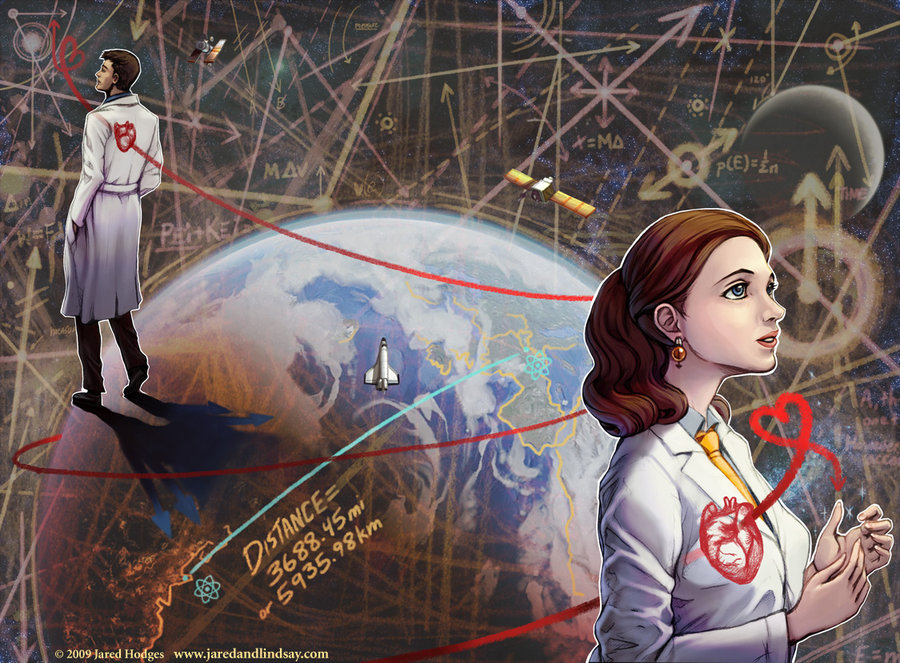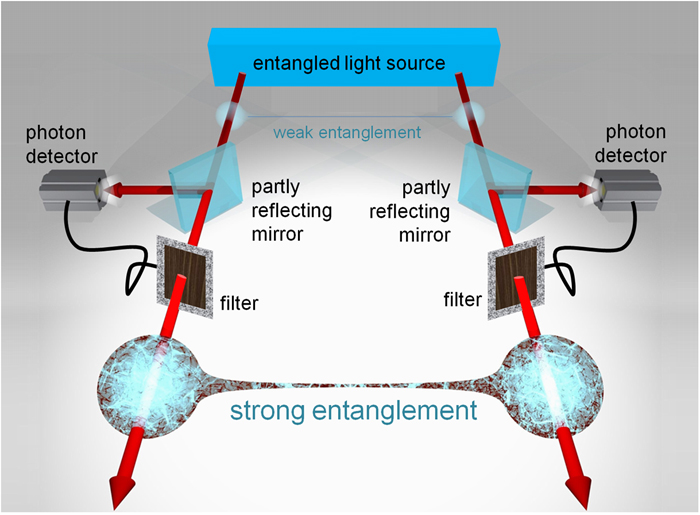Quantum Entanglement and the Persistence of Faith
 August 15, 2010-Pittsburgh, PA. I am not an expert in quantum physics but I worked decades in advanced technology sectors. A recent posting by NPR [1] on quantum entanglement experiments have me questioning core scientific beliefs but not my spiritual ones. If anything, my faith is not shaken when new scientific theories surface. The premise, and now possible proof that something can go faster than the speed of light [2] leads to incredible possibilities like teleportation [3] and information exchanges through time. Things in nature that science couldn’t explain before, like the efficiency of photosynthesis, the compass cells in birds that allow them to navigate [4] , and perhaps the mechanism of telepathy are discoverable in a new field called quantum biology.
August 15, 2010-Pittsburgh, PA. I am not an expert in quantum physics but I worked decades in advanced technology sectors. A recent posting by NPR [1] on quantum entanglement experiments have me questioning core scientific beliefs but not my spiritual ones. If anything, my faith is not shaken when new scientific theories surface. The premise, and now possible proof that something can go faster than the speed of light [2] leads to incredible possibilities like teleportation [3] and information exchanges through time. Things in nature that science couldn’t explain before, like the efficiency of photosynthesis, the compass cells in birds that allow them to navigate [4] , and perhaps the mechanism of telepathy are discoverable in a new field called quantum biology.

At no time have I believed a discovery in science, or an act of engineering to diminish the mystery of God. A mystery in this context is different from a problem. Whereas a problem is something that someone might eventually solve, the mystery of God is something we live with and touches people in different ways. Harvey Cox, in his book [5] explains the difference between mystery and problem this way:
The mystery of the universe often first confronts us when they (we) feel overwhelmed by its utter vastness. Does it have an edge or stop anywhere? And what is beyond that? Many also feel baffled by the conundrum of time. When did it start, and what was there before? Will it ever end? Then what? Even when they learn about a space-time continuum that is “finite but unbounded,” this hardly answers the dilemma. Then there is the inevitable question our prehistoric ancestors began asking soon after they stood upright. Is the universe friendly, hostile, or just indifferent to human life? ….
The awareness of one’s own mortality raises the question of the meaning of life, and this eventually spawned philosophy, religion, and culture. ….
Again, there are thoughtful people who suggest that since these questions are essentially unanswerable, we should just stop asking them. But what does it mean that we never do stop asking? The sheer persistence of such questions tells us something about what it means to be Homo sapiens, and their (our) intractability demonstrates what science can do, and what scientists agree it cannot, and should not be expected to do. They remind us, as Einstein put it, that “behind anything that can be experienced there is something that our minds cannot grasp, whose beauty and sublimity reaches us only indirectly.” ….
Despite the efforts of well-intentioned people who shrug them off as “meaningless,” we do go on wondering and asking, even though we recognize there will never be “answers” to these questions as there are answers, if not provisional, to scientific ones. That is why “mystery” and not “problem” is the appropriate designation. If in some distant future generation people do stop asking them, they will begin to look more like the humanoid robots of science-fiction novels.
Advances in science do not threaten faith today or its future. Instead, think of faith as being evoked by the mystery that surrounds us and not the mystery itself. Faith is a basic posture toward the mystery, and it comes in an infinite variety of forms [5]. Hindu and Buddhist perspectives on time and history differ markedly from those of Christianity and Judaism. Nirvana is different from the Kingdom of God. Furthermore there are radical dissimilarities in views of the human self and its relations to others. All people of faith have in common living with the mystery but it is how they live with it that differs. For this reason, practicing one’s faith while using science to travel among the stars has, and will continue to exist.
Humankind will always ask the deep questions, even as we explore His universe. Christians will persist in a sense of awe and reverence to a loving God as we gain earthly understanding of God’s vast creation. Cross on the moon supports the practice of faith, with a focus on honoring and acknowledging God the Father, the Son, and Holy Spirit on earth and on other worlds.
[1] http://ww.npr.org/templates/story/story.php?storyId=128910996&ps=cprs
[2] http://en.wikipedia.org/wiki/Quantum_entanglement
[3] http://www.wired.com/wiredscience/2010/02/quantum-photosynthesis/
[4] The Future of Faith ISBN978-0—06-175552-1, pages 24-26
